Iran’s Internet Penetration Rate Has Reached 122%
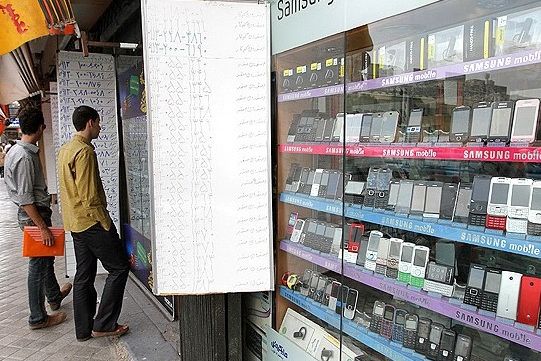
Despite widespread censorship, a report by the Iran’s state-run news agency IRNA says the internet penetration rate has surpassed 122 percent in the country.

Despite widespread censorship, a report by the Iran’s state-run news agency IRNA says the internet penetration rate has surpassed 122 percent in the country.
The agency said on Thursday that according to the latest data, the penetration rate of fixed and mobile broadband has exceeded 122 percent in total, mentioning the Covid-19 pandemic as one of the reasons for the increase.
That use of fixed broadband internet is about 13 percent of total as most of the growth took place in the mobile internet.
The number of Iranian mobile subscriptions has reached nearly 136 million, meaning that the penetration rate of mobile phones is more than 161 percent.
Iran has widely blocked websites and social media apps in the past two decades to restrict citizens’ access to information, but people use VPNs and other tools to circumvent the censorship.
According to social media management platform Hootsuite, the number of Global Internet users has already reached almost 5 billion as of 2021.
Datareportal’s statistics indicate that internet penetration in Iran stood at 70 percent in January 2020, while there were 58.42 million internet users. However, data by the World Bank said the use of the Internet by individuals was 84 percent in 2020.
Iranians were outraged last week when a group of 18 hardliners in a parliament committee claimed that they had ratified a bill to further restrict internet and social media access.
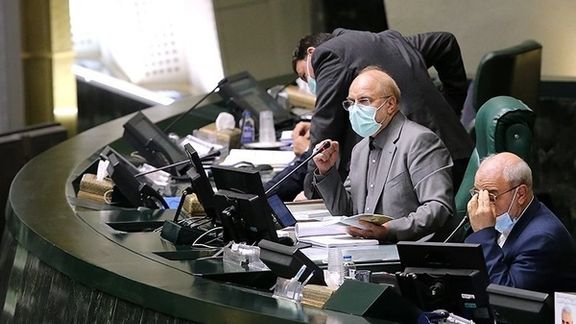
In a rare glitter of real journalism, news anchor Elmira Sharifi grilled a hardliner lawmaker for his attacks on those who oppose restrictions on social media.
Mehrdad Veis Karami, one of the 18 members of the Iranian parliament (Majles) who support a highly controversial bill to restrict social media access, called opponents "dogs on long leashes." The group of 18 hardliners last week claimed that they had ratified the bill in a committee and that there was no need to put the bill to vote by all the 290 lawmakers.
Later 167 Iranian members of parliament objected to the unlawful act and subsequently the parliament officially annulled the result of the voting. The bill is to be put to vote at the Majles later.
In the meantime, Karami started a campaign on social media against the opponents of the restrictive bill who in fact supported freedom of expression on social media. When critics lashed out at him, he said the "long leash" comment was a quote from a statement made by a former CIA chief. Iranian social media users quickly responded to remind him that no former or current CIA chief had made any such comment and suggested that the hardliner lawmaker do a google search before attributing fake statements to anyone.
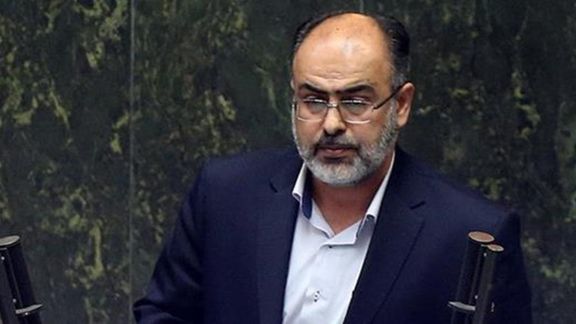
In a telephone conversation with Karami on live TV, Ms. Elmira Sharifi questioned Karami's presence on Twitter, which is officially banned in Iran, leaving the hardliner speechless. She further told him that he has insulted millions of opponents of the restrictive bill. The lawmaker slightly changed his complacent tone and said that he was not talking about the nation and that he was criticizing the opponents of the bill at the Majles. But the news anchor did not take that either and accused Karami of insulting nearly 200 of his colleagues at the Majles.
Although Iran's state TV is strictly controlled by the government, still anchors at times criticize some parliament bills before they are approved and become laws. Nonetheless, not every news anchor is brave enough to challenge even low-key politicians such as most members of parliament.
On the other hand, grilling Karami appeared absolutely legitimate, considering that even some clerics had lashed out at him for the controversial comment and his support for a legislation that would restrict people's freedoms and hurt millions who use Western apps, such as Instagram for commerce. In a video posted on Twitter, Iranian cleric Vahid Heroabadi returned the insult to Karami.
Numerous Iranians on social media lashed out at Karami and he had to take back his comment in a series of tweets. Some of the comments about Karami's insulting tweets were made by hardliner users and supporters of the government. As an example, Farid Modarresi said Karami was a mad dog who attacked the people and accused him of making the people angry by spreading irrational statement.
Nonetheless, most of Karami's critics called on him to leave social media platforms that are officially banned in Iran because of restrictions he and his likeminded colleagues have imposed.Thousands of small businesses operate from social media platforms and many Iranians, including the children use social media to voice their ideas or to vent their frustration
Over 220 of Iran's 290 predominantly hardliner lawmakers have their own Twitter accounts and use them for messaging as they are not important enough to be quoted on traditional media outlets.

Turkish prosecutors seek a 30-year prison sentence for 11 defendants, including at least one Iranian, charged over an alleged scheme to abduct Mehrdad Abdarbashi, an Iranian military pilot who fled to Turkey rather than serve in Syria.
Turkey's official news agency Anadolu (Anatolia) reported Wednesday that the 30-year term was demanded by the Prosecutor General's Office of Van province. The agency alleged Iranian intelligence had set up a $30,000 network in Van that had attempted three times to take Abdarbashi back to Iran. Anadolu earlier reported that the National Intelligence Organization (MIT) and police had arrested eight people, including an Iranian, in Van, south-east Turkey, September 24.
Speaking to Türkiye newspaper, Abdarbashi, a major and air-force helicopter pilot, said he had fled Iran and sought asylum after refusing to go to Syria. He told the newspaper a female Iranian intelligence agent had invited him to a house. He alerted Turkish authorities, and after she drugged him and others were preparing to abduct him, Turkish agents swooped.
In 2019 a ‘honey-trap’ was allegedly used to lure Ruhollah Zam, who ran a social-media channel on Telegram, to Iraq where he was abducted. Zam was executed in December 2020 after confessions aired on state television.
In February, Turkey arrested eight in an alleged Iranian plot to assassinate Israeli-Turkish businessman Yair Geller in revenge for the killing of nuclear scientist Mohsen Fakhrizadeh in 2020.
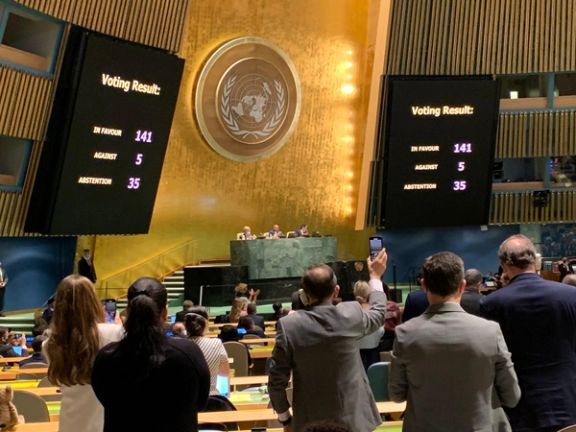
The Islamic Republic abstained from voting on a UN General Assembly resolution deploring the Russian invasion of Ukraine and urging the immediate withdrawal of the troops.
In an emergency session on Wednesday, the United Nations General Assembly overwhelmingly voted to condemn Russia over its attacks and demanded that Moscow stop fighting.
The resolution "deplores"Russia's "aggression against Ukraine." Although General Assembly resolutions are non-binding, they carry political weight.
Some 141 of the 193 member states voted for the resolution, and 35, including Iran and China, abstained the move aimed at diplomatically isolating Russia at the world body.
Russia itself, North Korea, Syria, Belarus and Eritrea were the only five that voted against the resolution.
A similar resolution was not upheld in the Security Council on Friday because Russia – as one of the five powers with a veto power – vetoed it. Ukraine’s allies referred the matter to the general assembly.
The last time Security Council referred a crisis to the Assembly was in 1982. It is only the 11th time an emergency session of the UN general assembly has been called since 1950.
Iran’s president and other officials have supported Russia’s move by blaming the United States and NATO for provoking the invasion
Iran’s state media and hardliner outlets have avoided using the word ‘invasion,’ while conservative and reformist media have in some instances criticized Russia for the invasion or expressed more nuanced views.
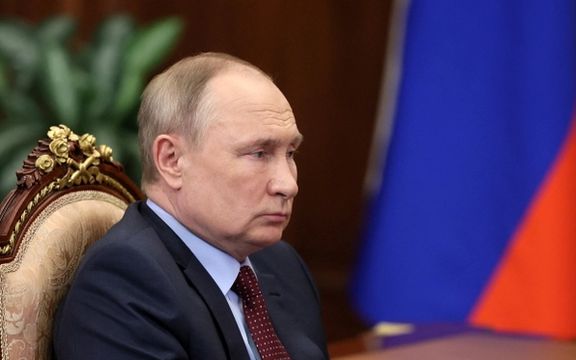
Fear of uncertainty and possible legal entanglements have made global banks jittery about dealing with Russia, similar to Iran's experience with sanctions.
Faced with an unprecedented level of sanctions on Russia, banks are taking a dim view of business with all Russian entities and dropping clients if there is even a slight doubt on their ties to that country, Reuters quoted bankers and lawyers as saying.
While European and North American governments have introduced serious banking and other business sanctions, countries in Asia and Elsewhere are introducing their own restrictions.
Sanctions experienced by Iran went a bit farther than those announced against Russia, such as cutting off all banks, instead of a select group, and the central bank from the global SWIFT. But the overall psychological and legal impact appear not be too different.
While global banks have extensive experience with sanctions and have invested billions of dollars in compliance programs in recent years, the curbs on Russia are unmatched in their scale, speed and complexity and may yet grow, said executives. Russia was a much larger financial player before the sanctions than Iran ever was.
To avoid falling foul of the rules and having assets and capital ensnared by new curbs, banks are adopting extreme caution in all of their dealings with Russian entities, actions that will likely exacerbate global trade disruptions, said bankers and lawyers.
The United States alone fined banks billions of dollars for breaching its OFAC (Office of Foreign Asset Control) restrictions since 2010. BNP alone was fined $8.9 billion in 2014, while Commerzbank and HSBC were also fined in billion-dollar figures. From 2010-2019, the US took action against 32 banks and all paid penalties.
Many of these cases were related to Iranian sanctions violations, which has made international banks extremely careful in their dealings.
A senior Hong Kong-based Asia trade finance banker with a global lender told Reuters that his compliance colleagues are asking more questions even if a financing deal involves a non-sanctioned Russian entity, directly or indirectly.
The issue is not just current sanctions, but what may still come. "It's not just managing risk from the existing sanctions, but also thinking about what more could possibly happen on that front," an Asian banker told Reuters. "No one would like to sign a billion-dollar trade finance deal only to be told a week later that the entity in Russia has also been added to the sanction list."
There is also the danger of aftereffects even when sanctions are removed. Iran experienced this syndrome when it resolved its nuclear issue with world powers in 2015 and international sanctions were lifted.
From 2016-2018 when most economic sanctions were removed, Iran had a hard time to get major deals and joint ventures. While the country needed tens of billions of dollars in investment, it was able to secure just a few billion dollars.
The fear that a regime is unpredictable and sanctions can be reimposed for new unacceptable actions, will keep the financial sector and corporations away from a country which has emerged from sanctions.
Charlie Steele, partner at Washington-based consultancy Forensic Risk Alliance and a former US Treasury Department sanctions attorney told Reuters, "Banks generally, and certainly the global banks, often tend to be very cautious and conservative with respect to sanctions, especially U.S. sanctions.”
With reporting by Reuters
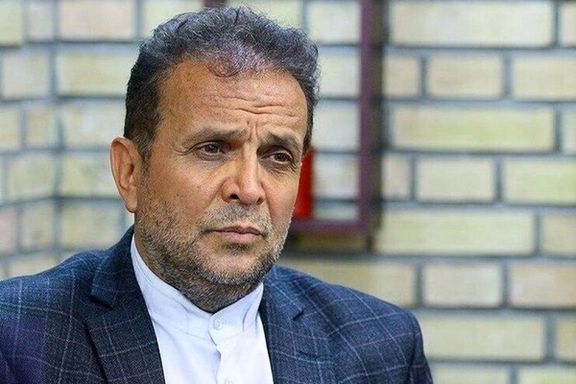
A senior Iranian lawmaker says the Islamic Republic’s position is close to that of Moscow on the issue of the Russian invasion of Ukraine.
The spokesman of the parliament's National Security and Foreign Policy Committee, Mahmoud Abbaszadeh-Meshkini, said on Wednesday that NATO has gone far beyond its territory in recent years and has faced a response from Russia.
He described the Russian attack on Ukraine as “a precautionary measure” to push NATO back to its place, noting that NATO did the same to Iran. “To surround us, they occupied Iraq and Afghanistan and imposed war on Syria, and the Islamic Republic helped to prevent larger wars at the request of their governments”, he added.
Abbaszadeh-Meshkini noted that there is a common problem in the world, and that is “the Westerners have expanded their hegemony with the help of NATO and are occupying wherever they want under the name of ‘preventive war’”.
The Islamic Republic has subtly supported Russia since the invasion began by accusing the United States and NATO of provoking the conflict.
Pundits and media in Iran are still heatedly debating the Russian invasion of Ukraine, West's reaction and Iran's official stance of implied support for Russia.
Iran’s state media and hardliner outlets have avoided using the word ‘invasion,’ while conservative and reformist media have in some instances criticized Russia for the invasion or expressed more nuanced views.